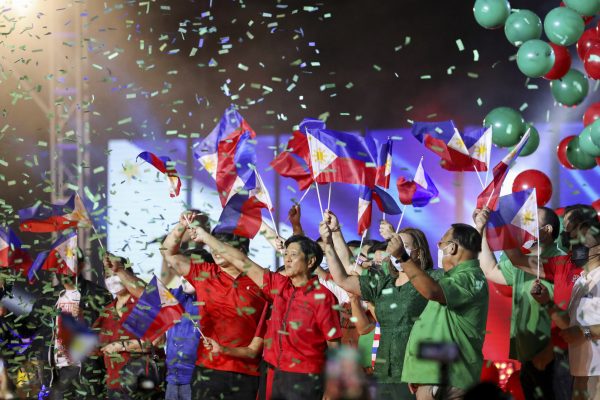
More than three decades after dictator Ferdinand Marcos and his family escaped the Malacañang Palace, the official residence of the Philippine president, his son Bongbong seems to be on a sure path to retake the most powerful office in the Philippines.
The elder Marcos was elected president in 1965 and ruled the country for more than two decades under a kleptocracy. During the dark days of martial law, which lasted from 1972 until Marcos’ 1986 ouster, human rights groups said more than 3,000 people were killed, 35,000 were tortured, and others disappeared for their resistance to Marcos’ iron-fist rule.
The Marcos family also lined their pockets. An unexplained fortune that experts estimated to be between $5 and $10 billion was stashed in several offshore accounts in Switzerland during Marcos’ rule.
With the help of the U.S. government, the Marcos family fled to Hawaii in 1986 with their paintings, jewelry, and cash. The patriarch eventually died on September 28, 1989 and the former First Lady Imelda Marcos and her children were allowed to return to the Philippines in 1991.
The harrowing stories of human rights victims during the martial law period and the billions of dollars stolen from millions of poor Filipinos should be enough to reject any attempt by the Marcoses to regain power.
Yet today, Marcos Jr. is close to taking over the Malacañang Palace, his family’s home for decades, in what activists say is the final step in the family’s grand scheme to resume power in the Philippines.
“I’m still voting for BBM because his father is still the greatest president we had,” Francisco told me when I told him these facts. “Not even Duterte can match Marcos.”
If the elections were held today, Marcos Jr. would easily win the presidency. Polls consistently show Marcos Jr. far ahead of his closest challenger, with a late February poll showing Marcos Jr. with 60 percent to Robredo’s 15 percent. That’s a clear mandate if that were to translate into actual votes.
But Marcos Jr.’s political opponents and the democracy-loving Filipinos won’t just hand the presidency over on a silver platter.
The upcoming national elections in the Philippines – in which more than 18,000 positions from president, vice president, and senators down to city councilor positions are up for grabs – are set for May 9. There is still over a month until the hotly contested elections, and a lot of things can happen in that time.
Inside the Philippines’ Critical Presidential Election
Source: Frappler

0 Comments